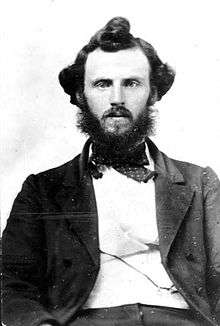Asa Mercer
Asa Shinn Mercer (June 6, 1839 – August 10, 1917) was the first president of the Territorial University of Washington and a member of the Washington State Senate.
Asa Mercer | |
|---|---|
 | |
| 1st President of the Territorial University of Washington | |
| In office 1861–1863 | |
| Succeeded by | William Edward Barnard |
| Personal details | |
| Born | Asa Shinn Mercer June 6, 1839 Princeton, Illinois |
| Died | August 10, 1917 (aged 78) Buffalo, Wyoming |
| Alma mater | Franklin College |
He is remembered primarily for his role in three milestones of the old American West: the founding of the University of Washington, the Mercer Girls, and the Johnson County War. Mercer Island in Lake Washington and Mercer Street in Seattle are named not for Asa, but rather his brother Thomas.[1]
The University of Washington
In 1861, as a member of one of the founding families of Seattle, Washington, a young Asa Mercer assisted his brothers in clearing stumps to make way for the new territorial university.
Besides helping with the foundations of the university, Mercer, being the only college graduate in town, was hired by Daniel Bagley as the university's sole instructor and president. However, Mercer did not receive a salary.[2]
The Mercer Girls
The young town of Seattle was attracting hordes of men to work in the timber and fishing industries, but few marriageable women were willing to make the trip to the remote Northwest corner of the United States. In March 1864, with public support and private funding, Mercer traveled to the Eastern United States in search of single women to work in Seattle as teachers and in other respectable occupations. This trip, and a subsequent trip introduced dozens of women to the Pacific Northwest, most of whom eventually married local men. Mercer himself married one.[2] The descendants of the Mercer Girls still represent a significant portion of Seattle's citizenry. The Mercer Girls story formed the basis of the television show Here Come the Brides.
The Johnson County War
Mercer became well known throughout the West as a publisher, and eventually found his way to Cheyenne, Wyoming, where he published the Northwestern Livestock Journal, a public relations vehicle for the moneyed cattle interests. As Mercer came to see the clearly underhanded treatment of individual ranchers by the cartels, he began to write more scathing accounts of the events that were unfolding on the open range. His account is told in his book The Banditti of the Plains (1894), which was suppressed in its day, and is still difficult to find in public libraries in some parts of the Western U.S.
Following the events of the Johnson County War, which included destruction of his newspaper office by arson, Mercer settled into the quiet life of a successful rancher in Hyattville, Wyoming, where he died in 1917.
References
- Warren, James (October 9, 2001). "Seattle at 150: Mercer brothers imprinted family name on the city". The Seattle Post-Intelligencer.
- Speidel, William (1967). Sons of the Profits. Seattle: Nettle Creek Publishing Company. pp. 95–96, 107–109.
External links
- Minor, David. "Handbook of Texas Online: Mercer, Asa Shinn". Retrieved 2008-06-07.